Search
The Howard G. Buffett Foundation, Tony Blair’s Africa Governance Initiative, and the World Food Prize Foundation Name Winners of $150,000 40 Chances Fellowships
Fellows to Launch Social Enterprise Projects Addressing Hunger and Poverty in Africa
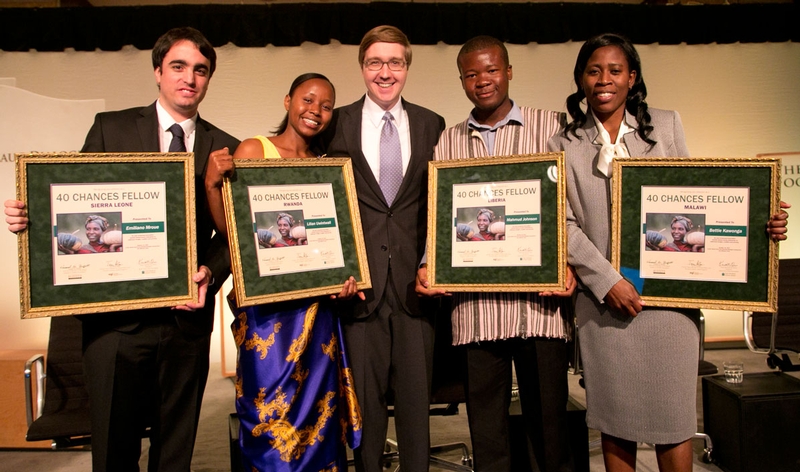
Howard W. Buffett, center, with the 40 Chances Fellows, Emiliano Mroue, Lilian Uwintwali, Mahmud Johnson,and Bettie Kawonga.
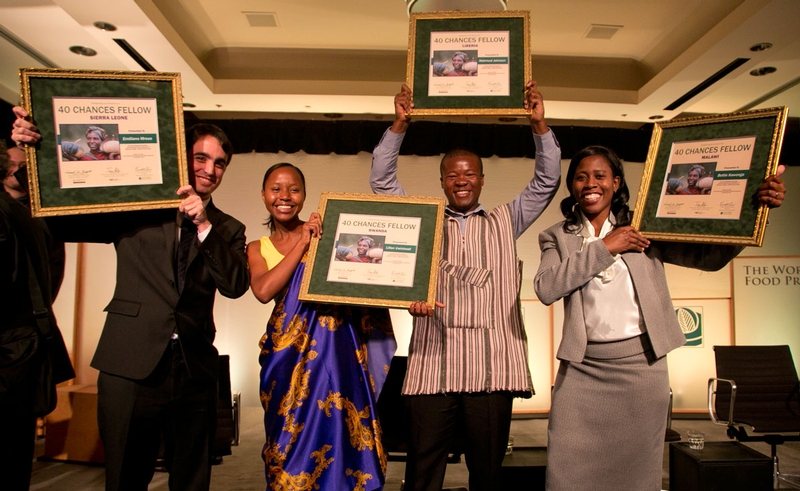
The 40 Chances Fellows plan to launch projects in Sierra Leone, Rwanda, Liberia and Malawi.
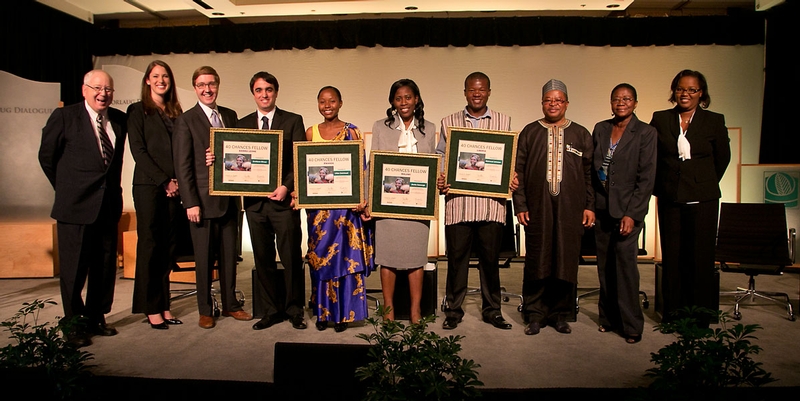
Representatives from The World Food Prize, the Tony Blair Africa Governance Initiative, the Howard G. Buffett Foundation; the 40 Chances Fellows; and the Ministers of Agriculture from Sierra Leone, Liberia and Rwanda.
Des Moines, Iowa (October 15, 2014) – Today at the World Food Prize international symposium, the Howard G. Buffett Foundation, the Tony Blair Africa Governance Initiative (AGI), and the World Food Prize Foundation named four young entrepreneurs under age 40 as the recipients of $150,000 fellowships to launch innovative social enterprise projects addressing hunger and poverty in Liberia, Malawi, Rwanda and Sierra Leone.
The 40 Chances Fellows will be formally honored on Thursday, October 16, which is World Food Day, during the Borlaug Dialogue international symposium. The fellows will give a press conference about their projects today at 3:30 p.m. CDT in the Des Moines Room in the Des Moines Marriott Downtown. (Update: Press conference video here.)
The winners are:
Mr. Mahmud Johnson, Liberia: Mr. Johnson will use his 40 Chances award to establish Kernels for Peace (K4P), Liberia’s first fair trade palm kernel oil processing factory, which will help bridge the gap between Liberia’s wasted palm kernels (estimated at a value of $4 million) and the market demand for palm kernel oil. By purchasing palm kernels from smallholder oil palm producers, K4P will help increase their incomes by an average of 25-35%. Additionally, K4P will create an estimated 85 additional permanent, full-time jobs for rural women and youth, and will invest 50% of its profits into the community after the first two years of operation. “Solving problems is what drives me as a social entrepreneur. I am concerned primarily with creating opportunities for my fellow Liberians – especially the youth – that will allow them to live in dignity and economic freedom,” Mr. Johnson wrote in his application. (Video)
Ms. Bettie Kawonga, Malawi: Ms. Kawonga will use her 40 Chances award to establish a network of Community Business Incubation Centers, which will enable under-employed Malawian youth to become successful entrepreneurs in the Malawian dairy sector. The Community Business Incubation Centers will equip youth with leadership and technical skills in dairy husbandry and value addition, agribusiness management, loans and savings, and business proposal writing. Youth will be matched with business mentors and provided with start-up funds from an endowment to be created using a portion of the 40 Chances award money. “The project aims at tapping into the current 'sleeping giant' of Malawi – the youth – who make up over 60% of the Malawian population but most of whom are either not employed or are un-employable due to lack of technical skills.” (Video)
Ms. Lilian Uwintwali, Rwanda: Ms. Uwintwali will use her 40 Chances award to scale up her Agro-FIBA platform, which provides e-extension services, market information, and financing information to about 3,000 smallholder farmers through the internet and through text messages. “Our vision is to deliver a brighter and food secure future for Rwandans by bridging the gaps in agriculture and strengthening value chains through Information and Communications Technologies (ICTs) to ensure food security and improve farmers’ livelihoods in an effort to alleviate poverty,” Uwintwali said. (Video)
Mr. Emiliano Mroue, Sierra Leone: An Argentinian businessman and co-founder and General Manager of West Africa Rice Company (WARC), Mr. Mroue will use his 40 Chances award to introduce and pilot a soy-rice crop rotation system on 50 hectares of WARC’s land with the ultimate goal to improve soil fertility and generate scarce animal feed to foster protein consumption, which is amongst the lowest worldwide. “Our lives are geared towards achieving a significant transformative change and we see agriculture as a powerful tool for development,” he said. (Video)
“World Food Prize founder Dr. Norman Borlaug’s two most ardent wishes were to promote development in Africa and to inspire the next generation,” said Amb. Kenneth M. Quinn, President of The World Food Prize that Borlaug founded. “We, therefore, are tremendously excited to be part of this initiative to invest in market-based solutions to overcome the greatest challenges in hunger and poverty.”
Howard W. Buffett, trustee of the Howard G. Buffett Foundation and co-author of 40 Chances: Finding Hope in a Hungry World, added the following: "We are proud to partner with the World Food Prize Foundation and The Tony Blair Africa Governance Initiative in recognizing these four extraordinary people. Each of the 40 Chances Fellows is living proof that a single individual has the potential to change the world, and we anticipate that their work will serve as a model for others hoping to do the same."
An extremely impressive array of leaders served as judges for this fellowship.
Liberia judges included:
- Dr. Florence Chenoweth - Minister of Agriculture of Liberia
- Amb. George Moose - Former US Undersecretary of State
- Dr. Per Pinstrup-Andersen - 2001 World Food Prize Laureate
- Dr. Richard Mkandawire - Vice President, African Fertilizer and Agribusiness Partnership
- Mr. Nick Thompson - Africa Governance Initiative
Malawi judges included:
- Dr. Pedro Sanchez - World Food Prize Laureate
- Dr. Ruth Oniang'o - Chair of the Board, Sasakawa Africa Association
- Dr. Daniel Karanja - Executive Director, Partnership to Cut Hunger and Poverty in Africa
- Mr. David Strelneck - Senior Advisor, Ashoka
- Ms. Rachael Wilson - Staff member, World Food Programme Malawi
Rwanda judges included:
- H.E. Pierre Damien Habumuremyi - Former Prime Minister of Rwanda
- Amb. Johnnie Carson - Former US Ambassador to Kenya, Zimbabwe and Uganda
- Dr. Gebisa Ejeta - World Food Prize Laureate
- Ms. Mpule Kwelagobe - NGO leader, Former Miss Universe Botswana
- Ms. Christina PioCosta-Lahue - Africa Governance Initiative
Sierra Leone judges included:
- Dr. Monty Jones - 2004 World Food Prize Laureate, Special Advisor to the President
- Ms. Dinah Hanson – Director, Association of African Business Schools
- Mr. Thad Simons - Former CEO of NOVUS, Board Chairman of IFAMA
- Dr. Natalie Hahn - Former UNDP / UNICEF staff member in Africa
- Mr. Andrew Ratcliffe - Africa Governance Initiative
- Mr. Nick Thompson - Africa Governance Initiative
The Tony Blair Africa Governance Initiative
The Tony Blair Africa Governance Initiative (AGI) helps to make government work for some of the world's poorest people. AGI provides practical support to leaders in Guinea, Liberia, Nigeria, Rwanda, Sierra Leone, and Ethiopia in order to bridge the gap between their vision for a better future and their government’s ability to achieve it. This means strengthening the government’s capacity to deliver programs that will change ordinary people’s lives for the better, from public services and rural development to infrastructure and job creation. Learn more at www.africagovernance.org.
The Howard G. Buffett Foundation
The Howard G. Buffett Foundation works to improve the quality of life for the world’s most impoverished and marginalized populations – including the nearly one billion men, women, and children who lack basic food security. This work is chronicled in the New York Times bestselling book 40 Chances: Finding Hope in a Hungry World authored by Howard G. Buffett with Howard W. Buffett. To learn more, visit our websites at: www.thehowardgbuffettfoundation.org and www.40Chances.com.
The World Food Prize Foundation
The World Food Prize is the foremost international award recognizing – without regard to race, religion, nationality, or political beliefs – the achievements of individuals who have advanced human development by improving the quality, quantity or availability of food in the world. The Prize recognizes contributions in any field involved in the world food supply – food and agriculture science and technology, manufacturing, marketing, nutrition, economics, poverty alleviation, political leadership and the social sciences. Each year, it also hosts the Borlaug Dialogue international symposium on food security, and several youth programs to engage the next generation. Learn more at www.worldfoodprize.org.
For further information, contact:
The World Food Prize Foundation: Nicole Barreca - nbarreca@worldfoodprize.org, 1-515-245-3735
Tony Blair Africa Governance Initiative: Jonathan Tanner - jonathan.tanner@tb-agi.org, 07920265325
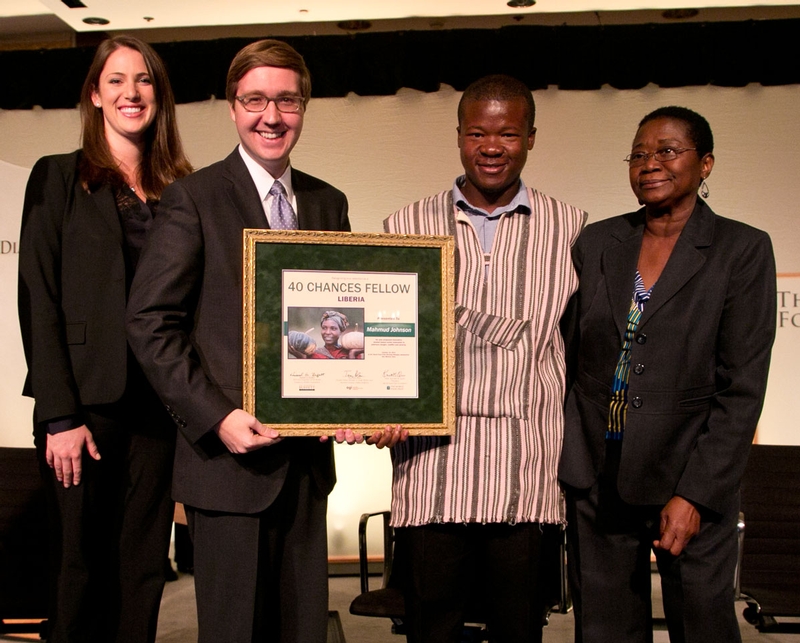 Mr. Mahmud Johnson, Liberia
Mr. Mahmud Johnson, Liberia
Mr. Johnson will use his 40 Chances award to establish Kernels for Peace (K4P), Liberia’s first fair trade palm kernel oil processing factory, which will help bridge the gap between Liberia’s wasted palm kernels (estimated at a value of $4 million) and the market demand for palm kernel oil.
As a social enterprise, K4P will work directly at the frontlines of socioeconomic transformation in rural Liberia. By purchasing palm kernels from smallholder oil palm producers, K4P will help increase their incomes by an average of 25-35%. Additionally, K4P will create an estimated 85 additional permanent, full-time jobs for rural women and youth, and will invest 50% of its profits into the community after the first two years of operation.
“Solving problems is what drives me as a social entrepreneur. I am concerned primarily with creating opportunities for my fellow Liberians – especially the youth – that will allow them to live in dignity and economic freedom,” Mr. Johnson wrote in his application.
Since completing a BA in Economics at Dartmouth College in 2013, Mr. Johnson has worked with smallholder farmers through a USAID program and served as a Senior Economic Analyst with Aurora Solutions, Inc. in Monrovia.
Mahmud Johnson - In his own words:
“I strongly believe that any venture I undertake should align with my personal values. As a social entrepreneur, I am driven deeply by a need to provide opportunities for my fellow Liberians (especially the youth) to improve their long-run livelihoods and labor market outcomes. I believe that Liberia will become a better country when its people are given the opportunities to improve their lot in life.
Those familiar with Liberia can attest to the fact that it is acutely difficult to maintain hope, given the slow trickle-down effects of what is in theory spectacular macroeconomic growth. Phone-in radio shows are abuzz with angry voices, with some even agitating for violent political change. In such an environment, we as social entrepreneurs need to focus on implementing the kinds of initiatives that have the greatest potential to promote inclusive growth and improve the socioeconomic conditions of ordinary Liberians, especially those at the base of the pyramid.
I was barely a teenager when the most recent civil war broke out in Liberia, but I vividly recall the horror and trauma my family and I had to endure to survive the war – from being held hostage at gunpoint, to losing all of our belongings. It is an experience that has undoubtedly scarred me and thousands of other Liberian youth.
I understand, both from a personal and an intellectual standpoint, how socioeconomic inequality, economic injustice, and severe poverty make countries more prone to civil war.”
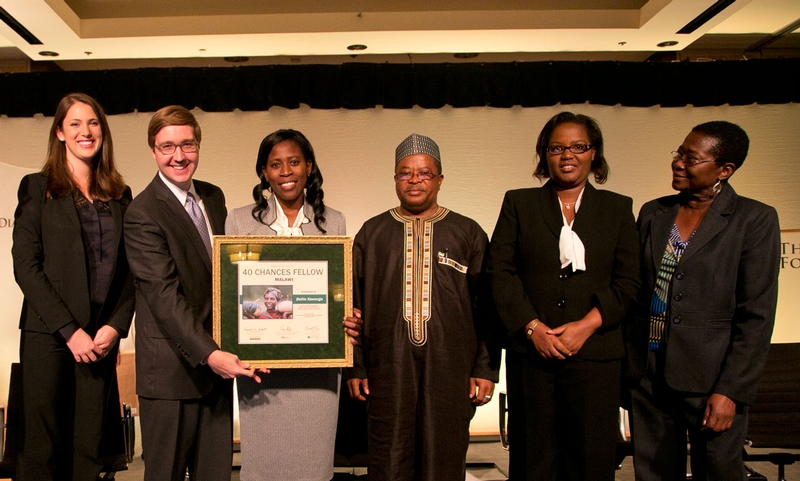 Ms. Bettie Kawonga, Malawi
Ms. Bettie Kawonga, Malawi
Ms. Kawonga will use her 40 Chances award to establish a network of Community Business Incubation Centers, which will enable under-employed Malawian youth to become successful entrepreneurs in the Malawian dairy sector. The Community Business Incubation Centers will equip youth with leadership and technical skills in dairy husbandry and value addition, agribusiness management, loans and savings and business proposal writing. Youth will be matched with business mentors and provided with start-up funds from an endowment to be created using a portion of the 40 Chances award money.
Currently Kawonga is pursuing her doctorate at the University of Kentucky. Kawonga is also a lecturer in Dairy Science at Lilongwe University of Agriculture and Natural Resources. Motivated by the conviction that investing in youth is essential to securing a positive future for Malawi, Kawonga has worked in Malawi to encourage entrepreneurship in the dairy industry.
Bettie Kawonga - In her own words:
“Malawi is sitting on gold! Imagine over 60% of its people are the youth, and yet the recent reports indicate that Malawi is ranked as the 8th poorest country (in the 21st century!) in the world! What can Malawi and the rest of Africa do, one would ask? My simple answer is let Malawi change its focus to 'awaken the sleeping giant' the youth, most of whom are either not employed or un-employable due to lack of technical skills. Malawi needs to increase its investment in sectors that promote youth development.
The project's vision is to create a critical mass of young skillful dairy entrepreneurs for sustainable growth and socio-economic development of Malawi. The project aims at tapping into the current 'sleeping giant' of Malawi’s youth, who make up over 60% of the Malawian population but most of whom are either not employed or are un-employable due to lack of technical skills. For Malawi to attain food and nutrition security, poverty reduction and sustainable growth and socio-economic development, there is an urgent need to tap into this very important human resource that lays idle in Malawi. The project seeks to equip Malawian youths with key technical (dairy) and leadership skills and inculcate in them an entrepreneurial spirit, while challenging them to take up the responsibility of lifting Malawi out of extreme poverty and perpetual food insecurity as today's leaders. The project will focus on youth, because studies have shown that investment in agriculture in Malawi has often times concentrated on other groups (women and men) and neglected the youth. However African governments, including the government of Malawi, have now realised that if their nations are to develop sustainably, there is a need to invest more in the country’s majority – the youth.”
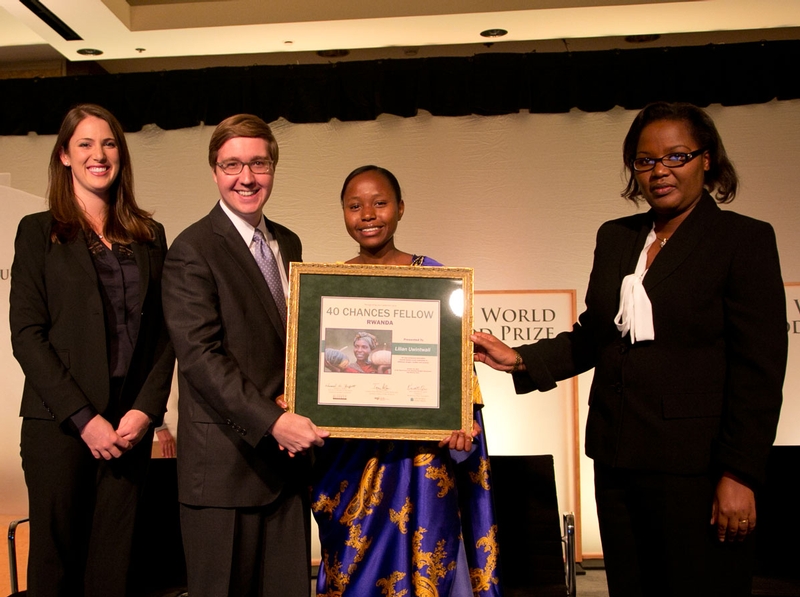 Ms. Lilian Uwintwali, Rwanda
Ms. Lilian Uwintwali, Rwanda
Ms. Uwintwali will use her 40 Chances award to scale up her Agro-FIBA platform through partnerships with more than ten different farming cooperatives and build M-AHWIII’s infrastructure and technology capabilities to enable continued expansion.
In 2012, Uwintwali’s software development firm M-AHWIII launched the Agro-FIBA technology platform, which provides e-extension services, market information and financing information to about 3,000 smallholder farmers through the internet and through text messages. Uwintwali and her colleagues decided to launch the Agro-FIBA platform after visiting with farmers and discovering their great need for information about available markets for their harvest, how to access bank loans and other useful information that would benefit them to improve on their farming activities.
Uwintwali’s vision is to deliver a more food secure future for Rwanda by bridging the gaps in agriculture and strengthening value chains through Information and Communications Technologies.
Lilian Uwintwali - In her own words:
“Our vision is to deliver a brighter and food secure future for Rwandans by bridging the gaps in agriculture and strengthening value chains through Information and Communications Techologies (ICTs) to ensure food security and improve farmers’ livelihoods in an effort to alleviate poverty.
M-AHWIII introduces Agro-FIBA platform, a mobile and online platform that brings together all key players in agriculture, creating an enabling environment in which ICTs enhance the impact of agricultural development programs across the value chains. Agro-FIBA links farmers to markets, financial opportunities and knowledge-base from agricultural experts to improve the productivity of farmers using the simplest web and mobile technologies easy for farmers to understand and use i.e. Text and Voice.
The Agro-FIBA platform is a platform we designed after digging in and taking into account the different challenges that the agricultural sector is facing. We didn’t overlook the problem; we resolved to get involved in solving the problem by tapping into the potential of ICTs to address some of these challenges that threaten food security for the next generation.”
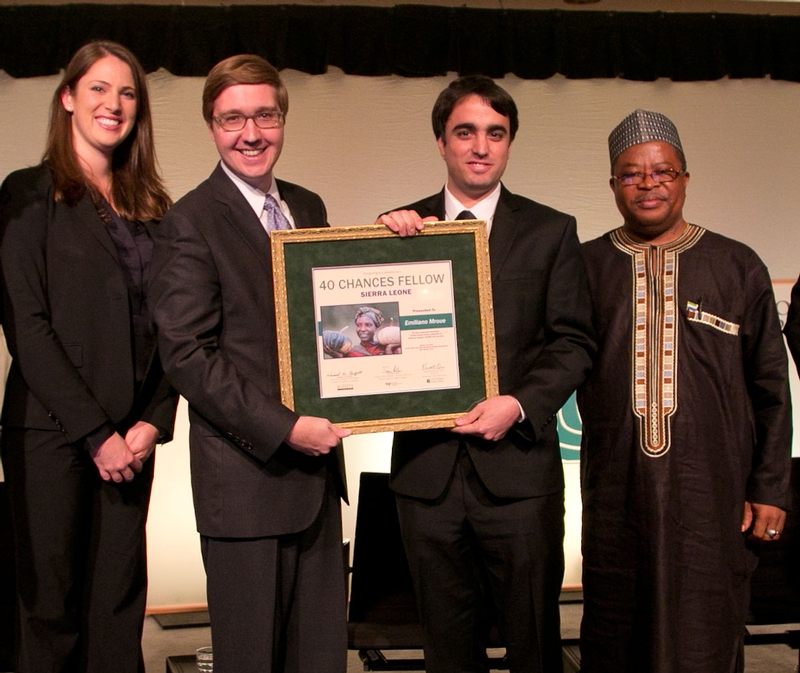 Mr. Emiliano Mroue, Sierra Leone
Mr. Emiliano Mroue, Sierra Leone
Mr. Mroue will use his 40 Chances award to introduce and pilot a soy-rice crop rotation system on 50 hectares of West Africa Rice Company' (WARC) land with the ultimate goal to improve soil fertility and generate scarce animal feed to foster protein consumption, which is amongst the lowest worldwide.
WARC integrates smallholder farmers within its production scheme to accelerate their transition from subsistence to sustainable farming, by catalyzing access to finance, technology and practical knowledge. It seeks to enhance food security, by producing the country’s main staple, rice.
Despite the high potential of a rice-soy cropping system in improving the livelihoods and diets of West African farmers, it has never been attempted in Sierra Leone outside of research plots. Should the rice-soy rotation prove successful, WARC will support the smallholder farmers it works with to integrate a similar rotation into their farming practices.
Mroue’s concern for the poor and marginalized is rooted in his experience growing up in the tough reality of a small farming town in the Argentine pampas, and by transformational experiences during travels around the world, from witnessing the lives of poorly paid silver miners in Bolivia to visiting refugees fleeing conflict near Kabul.
Mr. Mroue has a master’s degree in Management. In 2011, he left a position as a Corporate Manager of Purchasing at Henkel in Germany and relocated to Sierra Leone to found WARC.
Emiliano Mroue - In his own words:
“Our lives are geared towards achieving a significant transformative change and we see agriculture as a powerful tool for development.
First, it has the potential to develop the 70% of the Sierra Leonean population whose livelihoods depend on low-yielding subsistence agriculture. Second, if proper innovative sustainable practices are implemented, it has the potential to significantly reduce greenhouse gas emissions and the food ecological footprint in general, while preserving long-term soil health and hence humanity’s food security.
Subsistence farmers are under extreme living conditions as a result of a long-lasting conflict, which especially affects their food production capacity. Each year that passes in which our and other food production projects fail to involve farmers, results in marginalized rural Sierra Leoneans perishing to acute malnutrition, and many more children growing under-nourished, thus significantly diminishing their prospects in life. We are running a race for their health and mere survival.”
###


